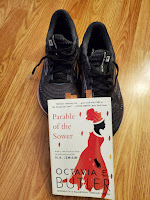
Open Water is a beautiful, soulful, intimate story about two
young, British-Ghanaian people falling slowly in love as they strive to survive
and thrive in a world that is often hostile to people in Black bodies. This
is a book to savor slowly. I absolutely loved this. I borrowed Open Water from
the library but I’m need to but it because I need own my own copy and be able to reread it again and again. In the meantime here are a few of my favorite passages.
“You came here to speak of shame and its relation to desire. There should be no shame in open saying, I want this.” There should be no shame in not knowing what one wants. – page 2
“You are safe here, you said. You are seen here. You can live here. We are all hurting, you said. We are all trying to live, to breather, and find ourselves stopped by that which is out of our control. We find ourselves unseen. We find ourselves unheard. We find ourselves mislabeled. We who are loud and angry, we who are bold and brash. We who are Black. We find ourselves not saying it how it is. We find ourselves scare.” – page. 34
“You’re looking forward to forgetting, albeit briefly, the existential dread which plagues you, which tightens your chest, which pains your left side. You’re looking forward to forgetting that, leaving the house, you might not return intact.” – page 69
“Let’s home in for a moment, on the boy, who you glimpsed sitting on the wall, cuffed, surrounded by police officers. With his beautiful dreaded hair framing his face like open curtains, and how he wanted to be seen and heard. What led him here? What led him to outlet his anger into another? That anger which is the result of things unspoken from and now and then, of unresolved grief, large and small, of others assuming that he, beautiful Black person in gorgeous Black Body, was born violent and dangerous; this assumption, impossible to hide, manifesting in every word and glance and action, and every word and glance and action ingested and internalized, and it’s unfair and unjust, this sort of death – being asked to live so constrained is a death of sorts – so you don’t blame him for the anger, buy why did his anger have to find a home in another who looked just like him?” – page 76
“…you were scared, that walking home in the night worried you sometimes, because you didn’t know which fate would meet you, the one who looked like you or the one who couldn’t see you, or couldn’t see you as you were meant to be seen, or whether you would arrive home without incident, and live to fear another day.” – page 76
“To be you is to apologize and often that apology comes in the form of suppression and that suppression is indiscriminate. Except here you must unfold your arms and from your chest say, you are tired…You begin to choke and gulp for air as tears stream down your cheeks…You must be heard. You think you are alone in this until you realize, she is with you too….You do not need to apologize here. When she asks, are you OK, do not fear the truth. Besides, she knows before you speak. There’s no solace in the shade. Let yourself be heard and hear her words…There’s no solace in the shade. Let yourself be heard and hea her words. Have faith.” – page 76
“Faith is turning off the light and trusting the other person will not murder you in your sleep.” – page 106
“You want to tell her there are some things you won’t heal from, and there is no shame in your hurt.” – page 130


 Rae is Ravenswood's newest misfit. She's 40, divorced, and has a big scar on her face. Twenty-eight-year-old Zach is Mr. Helpful. He goes out of his way to make others feel comfortable and helps whenever he can, whether the person needs an orgasm or a car to be fixed. Rae and Zach have a flirty friendship. When Rae needs to attend an awards ceremony that her cheating ex-husband will also be attending, naturally Zach offers to be her pretend boyfriend.
Rae is Ravenswood's newest misfit. She's 40, divorced, and has a big scar on her face. Twenty-eight-year-old Zach is Mr. Helpful. He goes out of his way to make others feel comfortable and helps whenever he can, whether the person needs an orgasm or a car to be fixed. Rae and Zach have a flirty friendship. When Rae needs to attend an awards ceremony that her cheating ex-husband will also be attending, naturally Zach offers to be her pretend boyfriend. It’s difficult to explain the plot of The City We Became. It
starts with a homeless kid. He’s New York, as in the city of New York – and he
needs help. There are five avatars who are supposed to help him, but first they
have to find him.
It’s difficult to explain the plot of The City We Became. It
starts with a homeless kid. He’s New York, as in the city of New York – and he
needs help. There are five avatars who are supposed to help him, but first they
have to find him.
